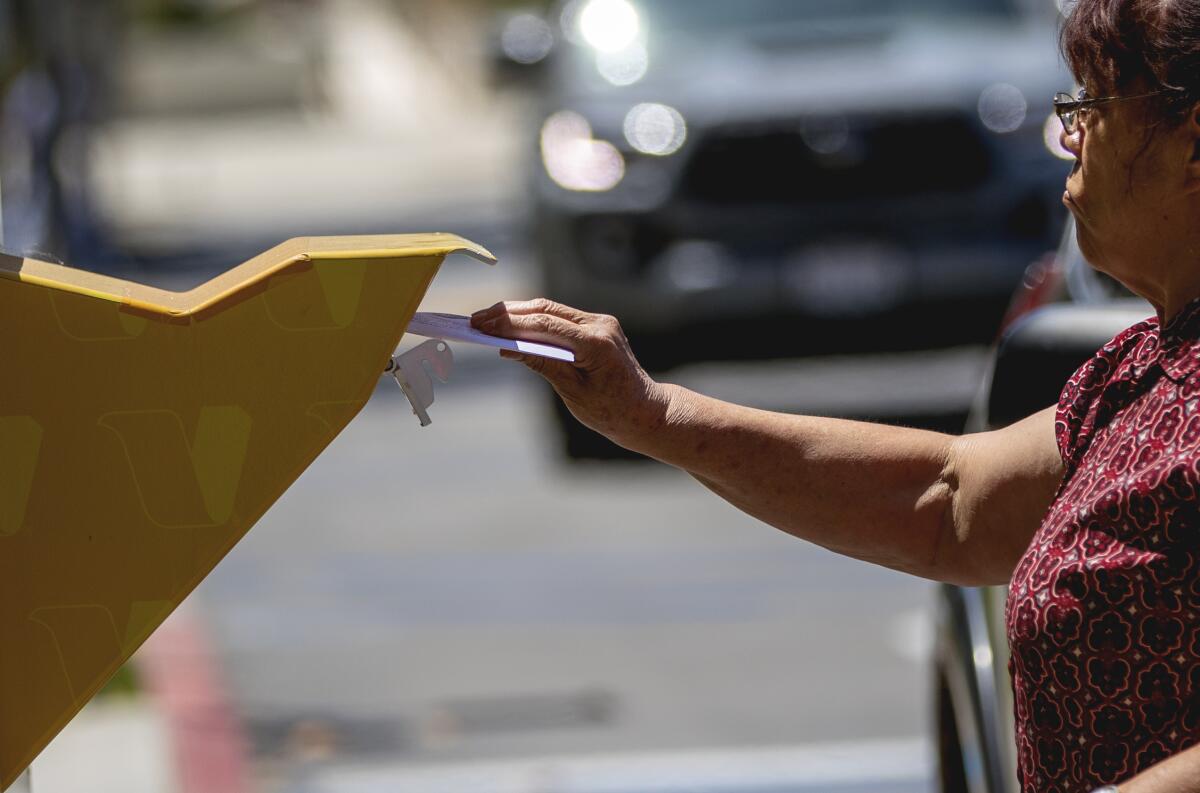California Politics: A primary election postmortem

More than 21.8 million Californians received ballots in the mail for Tuesday’s primary election — roughly equivalent to the combined total number of voters in 20 states.
If even half of those ballots were actually cast, the June 7 primary would be considered a smashing success. But don’t get your hopes up.
Few, if any, political watchers expected that kind of turnout — even as fierce local contests were held in Los Angeles, San Francisco and other communities across the state. Primary elections rarely light a fire under most California voters. Only two statewide primaries in the last four decades have seen voter turnout above the 50% mark. And both of those included high-interest presidential contests.
But even as the tallying of votes continues, a few things seem clear.
Newsom, Bonta get the results they wanted
It’s pretty easy to understand why Gov. Gavin Newsom and state Atty. Gen. Rob Bonta wanted primary election voters to send conservative Republicans to join them on the Nov. 8 ballot.
Democratic voters outnumber GOP voters by more than 2 to 1 in California. That, plus a healthy dose of unaffiliated voters who generally vote with Democrats, means a clear conservative will face an almost impossible hurdle to win a statewide office.
Of the two Democratic leaders, Newsom had the easier path to the political catbird seat. Every high-profile Republican who ran in last year’s unsuccessful recall election skipped a rematch this year. That left state Sen. Brian Dahle, an underfunded and rural Northern California Republican, as the candidate to carry the party banner.
Yes, there were other Republican gubernatorial candidates. But without any party help and even less money than Dahle, they had little means to communicate with enough voters.
Nor was there a large enough constituency for the Democratic-turned-independent homeless activist Michael Shellenberger. His critiques drew attention on social media and in a few news articles, but there was little else he could do to compete with Newsom.
Bonta, appointed to the job of attorney general and running in his first statewide race, undoubtedly didn’t want a November opponent who might have crossover appeal — the very pitch made by Sacramento Dist. Atty. Anne Marie Schubert in her primary race as an unaffiliated independent.
The incumbent succeeded in besting the field of challengers, with a close battle in early returns between Republican attorneys Nathan Hochman and Eric Early for the second spot in the general election.
Speaking of independent candidates ...
One of the early promises of the top-two primary — made by the supporters of the ballot measure that set it in motion, 2010’s Proposition 14 — was that it would finally allow independent “no party preference” candidates the opportunity to win elections. California’s campaigns had been dominated for too long by political parties, they said.
So let’s go to the results.
There were 41 “no party preference” candidates on the ballot Tuesday for statewide, legislative or congressional offices. In early returns, only two of those hopefuls appeared in one of the top two spots to move forward to November. And in one case, the candidate was one of just two names on the primary ballot.
As mentioned in a February edition of this newsletter, independent candidates don’t have the advantages of those who belong to parties — none more glaring, perhaps, than the financial support a political party can provide in excess of what a candidate can do on their own.
Chen cruises; double the Democrats
Lanee Chen has never run for political office before but is no stranger to politics, having been a top advisor to Republican nominee Mitt Romney in the 2012 presidential election.
This fall, Chen will be the guy to watch for Republicans as perhaps the GOP’s best chance to end its 16-year losing streak in statewide elections.
Chen won one of two spots in the November race for state controller, besting a field of Democrats in early returns. The question for voters going forward is whether Chen, a Stanford educator, can rebrand his party away from the social policy concerns that have felled prior candidates — even when the jobs they seek have no direct role in dealing with those issues.
Meanwhile, the primary was the first round of what’s likely to be a fierce intraparty fight in the race for California insurance commissioner. Democratic incumbent Commissioner Ricardo Lara may end up facing fellow Democrat Marc Levine, a Marin County member of the state Assembly, in November. Levine continues to lead Republican Greg Conlon for the second spot. Same-party fall elections happen occasionally under the top-two rules, but rarely for a statewide office.
Enjoying this newsletter? Consider subscribing to the Los Angeles Times
Your support helps us deliver the news that matters most. Become a subscriber.
California’s primary lightning round
— Rick Caruso and Karen Bass head to November runoff in L.A. mayoral race.
— San Francisco voters recall progressive Dist. Atty. Chesa Boudin.
— U.S. Sen. Alex Padilla (D-Calif.) advances in two separate ballot contests.
Stay in touch
Did someone forward you this? Sign up here to get California Politics in your inbox.
Until next time, send your comments, suggestions and news tips to [email protected].
Sign up for Essential California
The most important California stories and recommendations in your inbox every morning.
You may occasionally receive promotional content from the Los Angeles Times.




